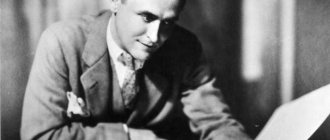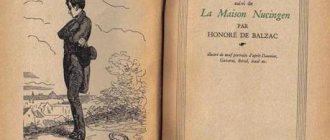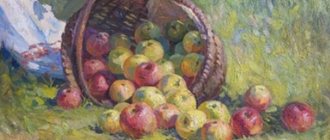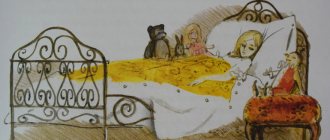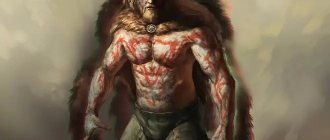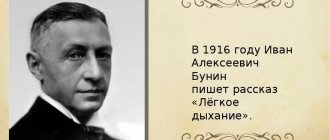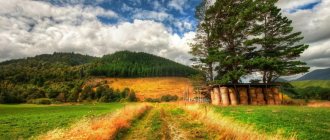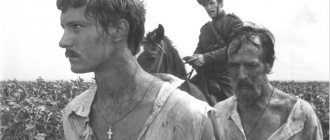A very brief retelling of the story “Mowers”.
The narrator talks about how he walks along the road, enjoys the beauty of nature and listens to the songs of the mowers. The mowers work in the field and wait for the next working day to end. The weather is beautiful. Meanwhile, the author begins to talk about how he managed to communicate with the mowers.
Simple men introduced the narrator to their customs and talked about how they spend their time. The haymakers sang songs that were as beautiful as nature. The author discusses the content of the songs. It was their meaning that awakened feelings for the Motherland in the narrator; he understands that he is filled with this love.
Nature in Bunin's story "Mowers"
By describing Russian nature in the work, Ivan Alekseevich showed how subtly he felt it. His birch forest seems to respond to the song of the mowers. The author describes the old road, which is overgrown with curly ant, and argues that his grandfathers and great-grandfathers walked along this road so many times. During the day, beautiful light clouds floated across the sky, and in the evening the sky began to turn golden.
Workers feel great in the bosom of this nature. The reader just wants to share the delight and joy conveyed by the author in his description of the area and the process of haymaking. Immediately before my eyes, the paintings of A. A. Plastov “Haymaking” and G. G. Myasoedov “Time of Passion” pop up. Mowers." They can even be called illustrations to Bunin’s story.
The author depicts the kinship of strong workers with nature. These people are not burdened by such hard work. They sing a song that merges with the birch forest. The trees respond to the wondrous singing. The color scheme in the work is also very rich: gray, golden, blue, red, pink, black, red. A feature of this and other stories is repetition, which is why it looks like a prose poem. The word “lovely” is repeated several times. It refers to the nature and song of mowers.
A summary of the story “Mowers” in detail.
This story happened a long time ago. The narrator walked along the road, listened and realized that in the distance the haymakers who were working in the birch grove were singing. It was a real ordinary Russian wilderness. Time in this forgotten or God-blessed country seemed to have stopped or did not matter at all. It was a warm June day, the work of the mowers was coming to an end. The tops of the trees were illuminated by the soft warm sun.
Author: Ivan Alekseevich Bunin
Mowers from Ryazan, working in the fields, arrived in Oryol places to earn money during the haymaking period. Ryazan men were friendly, cheerful, they were smartly and neatly dressed. Their appearance was pleasing to the eye, they walked and sang amid the eternal silence of the field.
A week ago they were mowing in the forest closest to us, and at lunchtime, after a meal, the mowers first drank water from a cool spring, greedily and sweetly, and then went back to the field to work. They had dinner in the evening, sitting around the fire, and ate food prepared there. The narrator did not see their dinner. He came closer, greeted: “Bread and salt, hello,” and looking closer, he saw with horror that for dinner there were fly agaric mushrooms, terrible with their dope. Laughing, the mowers said that they were sweet and tasted like chicken.
Then the narrator became interested in the singing of the Ryazan mowers. There was something marvelous and inexplicable in it that touched the soul, and that was the charm of the song. They reflected their life, way of life, nature, songs gave a feeling of unity and understanding that for everyone a common home was Russia.
The mowers walked forward through the forest, slowly moving forward, mowing down the grass. While singing, they either said goodbye to their native places or rejoiced at meeting their beloved. And even the surrounding hopelessness that seemed at first glance faded, and joyful feelings appeared from these songs.
The narrator noticed that in those distant days the Ryazan mowers were immensely happy in their own way, they were carefree and friendly. And now “Mother Cheese Earth has dried up, the life-giving springs have dried up - and the end has come, the limit of God’s forgiveness.”
Bunin. "Mowers." Contents in summary
So, let's try to briefly retell Ivan Alekseevich's small masterpiece. We begin our retelling of Bunin’s “Mowers” with the fact that at the edge of the forest, where young birch trees grow, the author and his companion see mowers at work. The writer notices their noble appearance, neatness and hard work. They enjoy what they do. This friendly company seems completely carefree.
Evening has approached, and the author again wants to meet the mowers. He sees them at dinner. They enjoy a dish made from fly agarics, which they find sweetish and reminiscent of chicken. The workers rested and decided to sing. It seemed that their sonorous voices filled the forest air with a special charm, a wondrous charm.
The song seemed sad, but they performed it with particular daring. At that moment the author realized that there is no hopelessness in life. Huge Rus' can help anyone and help anyone out. Until the night the mowers delighted with their songs. The writer enjoyed this moment and inhaled the fresh aromas of honey-like forest herbs, marveling at the harmonious interweaving of man and nature.
The end of the story is a little sad; the author nostalgically recalls the mowers and their singing. He felt happy next to these workers, and their songs gave him true joy. Bunin is sincerely sorry that he cannot return more of those fabulous moments.
The image of the Motherland in the work
While in exile, Bunin turns to the past and shows it transformed. The writer is drawn to his compatriots, he loves Russia. Therefore, in Bunin’s story “Mowers” the Motherland is shown as immeasurable and distant. The writer depicted the Ryazan peasants, their inspired work, a soul-touching song during haymaking on Oryol land. Thus, the author recalls those times when he felt good and calm in his homeland.
It is on Russian material that the works of Ivan Alekseevich’s emigrant period are built. In a foreign land, the writer constantly remembered his native land, its fields, villages, peasants and nobles, and nature. Ivan Bunin knew both the Russian peasant and the Russian nobleman very well. The West is alien to the writer; he could not write about it. Bunin's works were filled with the classical traditions of Russian literature. Also, the master of words did not ignore love, life, the future of the whole world.
The writer calls the Oryol land described in the story “my native side.” And he calls Russia not just the Motherland, but a common home. In the words “boundless native Rus'” he expresses his love for her. He is connected by blood to the unsightly Russian hinterland. The writer claims that no matter where fate takes a person, he will always have his native sky before his eyes.
Mowers
They were Ryazan, non-local, passed through these lands, moving to more fertile places. Friendly and carefree, unencumbered by anything, they loved work. Their clothes were better quality than the locals. This is how one can describe the peasants, briefly highlighting the story of I. A. Bunin “Mowers”.
The author rode on horseback a week ago and watched them mowing in the nearby forest. Having drunk sweetly from jugs of clean spring water, the men cheerfully ran to their work place. And then the narrator watched as they had dinner: they sat around an extinguished fire, taking out pieces of something pink from cast iron. Taking a closer look, he realized with horror that these people were eating fly agaric mushrooms. And they just chuckled: “They are sweet, like chicken.”
AUTOMIR
The story “Mowers” is a poetic sketch accompanied by the writer’s reflections on the fate of his people. The reason for writing the story was the song of the longshoremen the writer heard while traveling on a ship. Then Bunin heard the same strong, mighty, harmonious song as he drove past the mowers in the village.
In relation to this story, one cannot talk about the composition of the work - rather, these are the writer’s thoughts about the Russian people, about Russia, about our spiritual unity with our country. And there are no heroes here as such - the story about the work of the mowers is accompanied mainly by the thoughts of the author. Bunin admires the good work of the visiting mowers, their clothes, and the fact that each of them is part of a large indivisible artel. And the main charm of their song for the writer is not only that nature echoes it, but also that all of us, listening to it, feel like one whole - Russia.
The story was written in 1921 in Paris, i.e. in exile.
1. Meeting with mowers.
2. Evening June landscape.
3. Where do they come from, these mowers?
4. Last meeting with the mowers, their dinner.
5. The narrator listens to the song of the mowers.
6. The beauty of this song is the blood relationship between man and the surrounding nature.
7. The singing of the mowers is not even singing, but the sighs of a young, powerful chest.
8. The charm of this song lies in the fact that a person does not believe in his hopelessness.
9. Happy times are gone forever.
(6
ratings, average:
2.00
out of 5)
Essays on topics:
- Grigory Grigorievich Myasoedov is an original artist who depicts peasant life in his paintings. Painting “Time of sorrow. Mowers" was purchased personally by the Russian Emperor...
- The early work of Ivan Bunin is colored by romanticism, which is tinged with enthusiasm and admiration for the perfection of the surrounding world. For a poet and a beginner...
- In 1920, Ivan Bunin left Russia forever, engulfed in revolution. This decision was very difficult for the writer, and before...
/ / / Analysis of Bunin’s story “Mowers”
I. Bunin wrote the story “Mowers” in 1921 in Paris. France could not replace the writer’s homeland, so longing for the times spent in his father’s land settled in his heart. Ivan Alekseevich had an extremely negative attitude towards the revolution and could not accept it even while in exile. This position was reflected in the analyzed story.
In the work “Mowers” several themes can be distinguished: love for the Motherland, peasant labor and revolutionary changes. All of them are closely intertwined in the author’s thoughts. Reflecting on these problems, the writer tries to convey to readers the idea: we must not forget about our “roots”, erased by historical events, and also that we are all children of one country, therefore we must sing “with one breast.” I. Bunin also teaches to value the work of peasants and to be able to see the beauty in it.
The theme determines the system of images of the story. The central place in it is occupied by Russia and the Ryazan mowers. A man watching the haymaking works talks about them. His story is filled with descriptions of the appearance of peasants, nature, and labor. The outline of the event practically does not develop, so the narrator resembles the lyrical hero we are used to seeing in poetry. It is difficult to judge the origin of the narrator and why he ended up in the village. The man resembles a former peasant who managed to “break out into the world,” but nostalgia for rural nature leads him to free spaces.
The image of the mowers is a composite one. The author does not give individual characteristics to these people, but speaks about them in general. Using this technique, he shows the unity of the workers, hinting that they symbolize the “pre-revolutionary” Russian people. The image of the Motherland can also be called a composite image, because it is woven from landscapes, human images and the thoughts of the narrator.
When creating landscapes, the author builds on the image of the birch tree, which traditionally symbolizes Russia. Landscape sketches and descriptions of work prompt the author to think, and therefore play a very important role, although they are non-plot elements.
There is no plot, in the usual sense for us, in the story, but its elements can be roughly identified. The exposition is a description of the road and a mention of how long ago the events took place. Tying is the first meeting with the mowers. The development of events is a story about the afternoon tea and dinner of the workers, a reflection on the meaning of their songs. There is no climax in the work. The denouement is a story about “the limit of God’s forgiveness.” In each of these parts there is a lyrical digression.
I. Bunin originally embodied his thoughts and memories in artistic form. Linguistic means play an important role in the text. For example, to show the unity of man and nature, to prove the eternity of “antiquity,” the author used metaphors: “the birch forest... resoundingly responded to them,” “the road... rugged... with traces of the ancient life of our fathers,” “we were all children of our homeland.” The epithets add expressiveness to landscape sketches, portraits, and descriptions of labor: “field silence,” “they were carefree, friendly,” “good, healthy Russian farm laborers.”
Bunin is a writer who had to migrate and live in a foreign land, but he still continued to write. And he wrote not about foreign countries, but about his native Russia, with which he was always mentally together, about the country that was always in his heart. During the period of emigration, the writer often recalls his native land, Russian fields, villages and villages, peasants. Bunin admired Russian nature and this is evident in his works, where he often gives a detailed description of nature and “Mowers” is no exception. It was Bunin’s story “Mowers” that became a vivid example of how much the writer loved his native land, how well he remembered Russian nature, and how well he knew human nature.
At the literature lesson we got acquainted with Bunin and his works. And now I have to make a story based on Bunin’s story “Mowers”. But first, you need to get acquainted with Bunin and his work “Mowers” in its brief content, which will allow for a more accurate analysis of it.
Bunin Kostsy summary
So, Bunin’s story “Mowers” and its summary takes us to the fields. Already at the very beginning, the author gives a detailed description of nature, among which the hero of the story encounters mowers. Or rather, in this work, as such, there are no heroes. Here is a description of memories, a description of how the narrator once met mowers on his way. These were not local mowers. Creating the image of the mowers, Bunin writes that they were from Ryazan from distant distances. They passed by, heading to more fertile lands. The mowers were friendly and loved to work.
One day the narrator watched the mowers at work and how they ate. It turned out that they eat fly agarics, and they say that they are tastier than chicken. They are washed down with spring water.
The narrator watches the mowers in fascination and it seems to him that he would look and listen like that. Yes. I listened to the songs that the mowers sang and they aroused only admiration, and the beauty was that we were all children of the Motherland, and we all felt good. And this homeland was Russia, whose soul could sing in the same way as the mowers sing, evoking in everyone only the best and sincere feelings. But the work ends completely differently. A phrase that brings us back to reality and we understand that these were memories from the past that can never be returned and that life will not return forever.
Working on Bunin’s story “Mowers” and analyzing the work, we can say that here the author portrays men who came to Oryol places to earn money. They sing a song that becomes not just a song, but a song, which allows them to be alone with nature. In the end, the author talks about the lost life and the melancholy that is caused by the impossibility of returning everything.
Bunin Mowing plan
1. Description of Russian nature 2. Mowers and their description 3. Dinner of mowers 4. Song and its charm 5. What else is the charm of the song? 6. Infinitely distant and irrevocable days
Time and history of creation
The story was written in 1921 in Paris, i.e. in exile. I. A. Bunin’s story is based on the following memories: “When my late brother Yuli and I were returning from Saratov on a Volga steamer to Moscow and were standing in Kazan, the loaders, who were loading our ship with something, sang so delightfully loudly and in unison that My brother and I were completely delighted with our whole being and everyone said: “Only Russian people can sing like that freely, easily, with their whole being!”
As in many of Bunin's works, there is no clear plot in the story. The content of this work is the narrator’s recollection of how he once, walking along the road, heard mowers mowing and singing in a birch forest nearby.
The narrator conveys his feeling associated with the impression of this singing, the understanding that he will never forget this early evening hour, and most importantly, he will never fully understand what the charm of this song of the mowers is.
Poetics, composition, idea
The story “Mowers” can also be called a lyrical essay, a poetic sketch.
There is no clear plot or composition of the work - these are the writer’s thoughts about the Russian people, about Russia, a dream of spiritual unity with his country. We can say that there are no heroes in the story. There are no images of actions, the work of mowers. At the center of the work are the author’s feelings and thoughts. He thinks about the mowers, about the fact that each of them is part of a large indivisible artel. The mowers sing, without realizing that their song harmoniously flows into the life of nature. Listening to their singing, the author feels one with this people, part of his homeland, Russia.
This story can be called a prose poem. It echoes the story “The Singers” by another Russian writer, I. S. Turgenev, where we also talk about the talent of the people, the power and beauty of folk song.
The writer uses vivid visual means in the work:
Epithets (early evening, field air, clouds in the already pinkish west);
Metaphors (a fresh young forest, full of waist-deep honey herbs, countless wild flowers; our common home was Russia, we were children of our homeland; feelings were told with sighs, half-words; the sonority of a birch forest; responding distance);
Comparisons (“... it was as if there was no singing at all, but just sighs, heaving of a young, healthy, melodious chest...”).
From Bunin’s inspired descriptions, a holistic image of a country that once existed, but which will never exist again, emerges. Written in exile, the story also carries a feeling of bitterness associated with the loss of his homeland, and conveys Bunin’s great love for it.
Gorkovenko Angelina Gavrilovna Position: teacher of Russian language and literature Educational institution: State Budgetary Educational Institution Secondary School No. 398 Locality: St. Petersburg Krasnoselsky district Name of material: article Topic: The image of the Motherland in the works of I. A. Bunin (using the example of the story “Mowers”) Date of publication : 02/05/2017 Section: secondary education
Image of nature and folk labor. Image of the Motherland.
I.A.Bunin “Mowers”
The story “Mowers” was published in the anthology “The Bronze Horseman” in Berlin.
Reprinting, Bunin repeatedly edited it. In the notes “The Origin of My Stories,” written shortly before his death, Bunin made the following entry about “Mowers.” “When my late brother Yuli and I were returning from Saratov on a Volga steamer to Moscow and stood in Kazan, the loaders, who were loading our ship with something, They sang so delightfully powerfully and together that my brother and I were completely delighted... and everyone said: “Only Russian people can sing like that freely, easily, with their whole being.” Then we heard, while riding in a racing droshky with my nephew and brother Julius along the high road, how mowers sang in the birch forest next to the high road - with the same freedom, ease and whole being. I wrote this story in Paris in 1921, remembering Kazan and this birch forest.” The writer in exile turns to the past and creates it in a transformed form. How great the writer’s desire for his compatriots is, how deep his love for Russia is, is evidenced by his story “Mowers,” which talks about Ryazan peasants, their inspired work, touching the soul with singing during haymaking on Oryol land. In the story “Mowers” the main charm for him is not only in the peasants and their wonderful singing: “The beauty was that we were all children of our homeland, and we were all together and we all felt good, calm and loving, without a clear understanding of our feelings , because you don’t need them, you shouldn’t understand when they exist. And there was also a charm (no longer recognized by us then) that this homeland, this common home of ours, was Russia, and that only its soul could sing as the mowers sang in this birch forest responding to their every breath.” Working on the story “Mowers”
While reading the story “Mowers”, students can be asked questions: What picture did you imagine while listening to the beginning of the story?
What colors did you see? What artistic and visual means used by the author help convey to us these colors, smells, sounds. What main micro-themes can be identified by reading the text? Name them.. (Theme of labor, nature, folk song, theme of the homeland) How is nature presented in Bunin's story? How do the heroes of the story feel in the bosom of this nature? Please confirm your answers with text. Who are the heroes of the story? (Mowers, mowers). Find their description. It is recommended to do vocabulary work in class. Vocabulary work.
Shoe covers are a type of peasant footwear.
Onuchi are pieces of material wrapped around the leg (shin). Gusset is a fabric insert on a peasant shirt, most often under the armpit. What does the narrator note about the characters? How do they relate to each other? How do they feel about work? (“Want to work”). How is labor described in the story? Next, draw students' attention to the episode where the author describes the singing of peasants. The joy that this song gave people testified that “we were infinitely happy in those days.” Bunin regrets that these are fabulous days - alas! - irreversible. Listening to an ancient folk song (teacher's choice)
Conclusion.
Any folk song makes a strong impression and is thought-provoking.
The central theme is the theme of the Motherland.
What specifically in this passage and throughout the story expresses the love of the Russian people for the Motherland, unity with it?
(In love of nature). Let us recall the description of the work of mowers. Why does hard work come easy to them? (They feel unity with nature and their homeland). Who else feels this unity? Prove your answer with text. (Narrator.. “...in the blood relationship that was between them and us, between them, us and this grain field...”). What is home for us, Russian people? (Russia). Home task. Write an essay. Student’s essay “Analysis of the story by I.A.
Bunin's "Mowers" Bunin tragically experienced a break with his homeland. In his works written in exile, he focused all his attention on memories of Russia, on the experiences of the past forever gone. In the work “Mowers” one hears a painfully heartfelt longing for the “native side”. This is a lyrical memory, very warm and sincere. The title of the story is simply “Mowers.” And its beginning seemed simple: “We were walking along the high road, and they were mowing in a young birch forest near us and singing...” And the plot is not complicated: a small artel of Ryazan men walked through the Oryol places “to earn money during working hours in steppes." So why then does the story have a huge emotional impact, awakening complex feelings in the soul - now melancholy and pain, now peace and hope? Bunin captured the situation in the perception of a specific person. Before us is a deeply feeling person. The writer is not just a contemplator, he is a “feeler”, merged with Russian nature, with the mowers, their song. “Feeling is everything,” wrote I.A. Bunin in 1923. Reality - what is reality? Just what I feel. The rest is nonsense." And the “central hero” of this story becomes Bunin’s feeling. His deep love for Russia and the Russian people. It is manifested both in the description of the Russian landscape and in the description of the men (“they were carefree, friendly ...”, they were “eager to work,” unconsciously rejoicing at its beauty and efficiency...” “They were neat, beautiful...”), and even in how they ate “fly agarics, terrible mushrooms with their dope” and how “they drank long, sweetly, as only animals and good, healthy Russian people drink.” Bunin acutely feels the unity of Russian people with nature, their inseparability, unity. “They sang, and the birch forest responded sonorously to them.” The landscape is magnificent. The range of speech means is wide: with the help of epithets and verbs with the meaning of a color attribute, a variety of shades of color are conveyed; metonymic attributive adverbs characterize both objects and attributes; sound, light, and tactile characteristics are given that interact with each other. “They mowed and sang, and the entire birch forest, which had not yet lost its density and freshness, still full of flowers and smells, resoundingly responded to them... It was late afternoon on a June day... The sun was leaning to the west, began to set in beautiful light clouds, softening the blue behind the distant slopes fields and throwing towards sunset, where the sky was already turning golden... A flock of sheep turned gray ahead.” This concentration of speech means in a relatively small space of text makes the language unusually bright and figurative. In the story, the author depicts events from a temporal point of view: “It was a long time ago, because the life we lived at that time will not return forever.” And it becomes clear: the author is sad not about the irretrievably gone years, but about that virgin, epic life that he remembered. His work is structured as a monologue-memory. The lyrical mood is created by exclamations, the technique of silence, rhetorical questions, and repetitions of various types. The story uses anaphoric constructions, sound, lexical repetitions, first of all, the words Russian, repetition of the same element-prefix without - (selflessness, carefree, thoughtlessly, endlessly, boundless), repetitions of the same root words: “The beauty was in that unconscious, but the blood relationship that was between them and us - and between us and this grain field... The beauty was that we were all children of our Motherland, and we were all together and we all felt good, calm and loving..." The rows of these units in combination with folklore images (flying carpets, invisible hats, rivers of milk) with elements of folk songs create an image of Russia “in ... days, now infinitely distant - and irrevocable. Throughout the story, the theme of “the charm of the Russian song” is heard. The singing of the mowers seems extraordinary to Bunin. This feeling is transmitted to us, the readers. “What was the charm of this song, its inescapable joy?” And the author answers: “...songs were sung this way only in Russia and with that spontaneity, with that incomparable ease, naturalness, which was characteristic of the song only to the Russian.” The mowers sang: “Forgive me, farewell, my dear little side.” And Bunin understands that they were saying goodbye to their “dear side,” and to their happiness and hopes. And at the same time, he convinces that there is no “genuine separation from her, from the Motherland, for a person, that no matter where his fate takes him, his native sky will still be above him, and around him will be the boundless native Rus'.” And the reader understands that this is the song of I.A. Bunin himself, whom fate has thrown far from dear Russia, that it is his soul that sings the song “about his dear side.” The lyrical tonality, “amazing figurativeness” of the work, the wealth of figurative means makes the story surprisingly vivid, convinces the reader of enduring values - love for the people of our native Russia.
